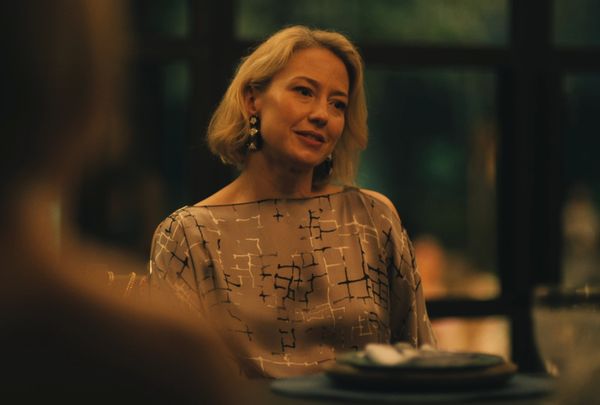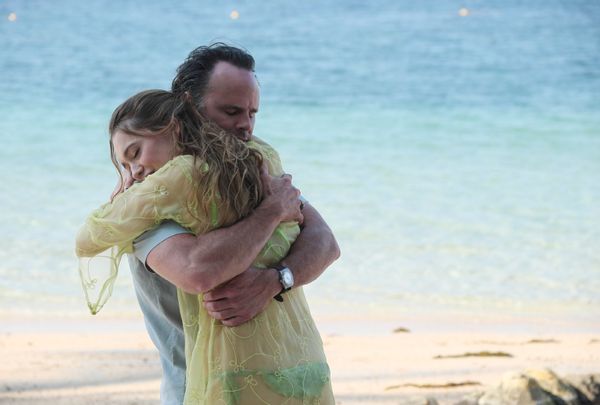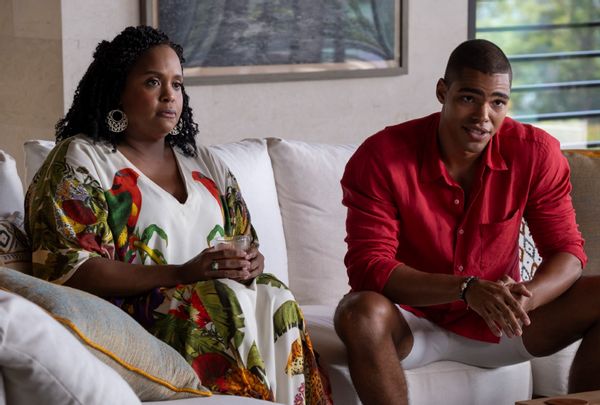At the very top of “The White Lotus” season finale, a Buddhist monk tells viewers that, even though we wake with anxiety (raises hand), “It’s easier to be patient once we finally accept that there is no resolution.” The conclusion of the third season was certainly darker than the finales of the first two seasons of the social satire, and seeing as the show deals in human behavior and muddled motivation, there isn’t a resolution, as there’s a lot left to interpretation. The provocative images that creator, writer and director Mike White leaves viewers to consider provide a litmus test of our own hidden desires and twisted worldviews. These scenes usually underscore the denouement of a character’s development throughout a week of unsettling vacation time, and none of the outcomes are generally good, even if they might seem to be on the surface.
The provocative images that Mike White leaves viewers to consider provide a litmus test of our own hidden desires and twisted worldviews.
Take Quinn Mossbacher (Fred Hechinger) from Season 1, for instance. As his preoccupied parents and self-absorbed sister boarded their plane back home, he joyously joined a group of local Hawaiian men rowing in the ocean. The image is a memorable one — a young kid finally free of the perceived trappings of his moneyed existence — but there are definitely other ways that scene can be understood. In addition, the memorable yet melancholy moment in which Daphne (Meghann Fahy) beckons Ethan (Will Sharpe) to join her in a tryst on a secluded island to get back at their spouses for potentially cheating on them is wide open for interpretation. (They totally did it, right? But we don’t know for sure!)
In the Season 3 finale, several scenes stick out as the ones that we’ll be turning over in our minds over and over again as we wait to tear into the (already greenlit) fourth season of the show.
Let’s start with the Ratliff family and the almost-accidental death of Lochlan Ratliff (Sam Nivola), the youngest and most naïve of the bunch. After his dad Timothy (Jason Isaacs) decides to abort his plan to poison his two eldest children and his wife with pong-pong-laced piña coladas, he stupidly leaves a blender with remnants of the elixir on the counter overnight. Being a disgusting teenage boy, Lochy finds the blender the next morning and doesn’t rinse it out before using it to whip up a protein smoothie, which his brother Saxon (Patrick Schwarzenegger) has been encouraging him to drink all week so he can become a “man.” Instead of becoming a man, Lochlan almost dies as a dumb boy who didn’t think to wash a blender before using it. This chain of events is almost as idiotic as Tanya (Jennifer Coolidge) killing all her would-be attackers in the Season 2 finale before frantically jumping over the side of the boat and dying the stupidest death ever. I swear, almost all of the “White Lotus” characters should be nominated for Darwin Awards.
Sam Nivola and Jason Isaacs in “The White Lotus” (Stefano Delia/HBO)As his heart rate slows and his body begins to shut down, Lochlan has a vision of himself drowning. Inky black water surrounds him as a blinding light focuses on his body, making his pale skin glow like a marble statue. As the poison takes hold, Lochlan looks up at the surface to see the silhouettes of his family members, which are then replaced by silhouettes of Buddhist monks. When he wakes up from his poison-induced coma, Lochlan finds himself in his father’s arms and declares that he’s seen God.
Now, I’m not sure how the White Lotus works, but if they’re not using those pong-pong seeds in some sort of mystical, transcendent, come-to-God therapy at their Thailand location within the next few months, I’d consider that a missed opportunity. People pay big bucks for crazier things. And Lochlan seems to recover just fine without any sort of medical attention, so it’s all good, right? But as he travels home on the boat, shutting out the world with giant sunglasses and a baggy hoodie, Lochlan doesn’t really seem to have learned anything from his reverie. In fact, he seems to have regressed in some ways. Let’s just all hope that God wasn’t telling him to choose Duke.
Want a daily wrap-up of all the news and commentary Salon has to offer? Subscribe to our morning newsletter, Crash Course.
One person who isn’t looking for spiritual transcendence is Laurie (Carrie Coon). In another unforgettable image from the finale, Laurie shows up to dinner with her friends after a day of staving off an alcohol-and-life-choices hangover. She gives a brief speech about how she never really found her passion and how every time she sees her old friend group, she gets sad because she’s constantly measuring herself up to them. But Laurie has an epiphany about her life. She says, “I don’t need religion or God to give it meaning because time gives it meaning.”
It’s a great line, and a great line reading from Coon who is sure to be nominated for this bracing monologue come Emmy time in the fall. But then, Laurie goes on to say that she’s just happy to be at the table with these two women. This is certainly meant to be a moment that serves to solidify the bond between these old friends, but honestly, it also feels pretty tragic. All these women have done all week is snark at one another and talk behind each others’ backs, and now Laurie wants to tether her sense of self-worth to them? And, furthermore, she’s just happy to be with them? Shouldn’t she at least strive to be an equal in this tangled friendship triangle?
 Carrie Coon in “The White Lotus” (Courtesy of HBO)These are thoughts I will be having as images of an impassioned Coon dance in my head over the next few weeks. Sure, we can all interpret this scene — and the subsequent scene in which the three women are canoodling happily together on the boat ride home — as a happy ending, but there are certainly other ways to read into what’s happening here. None of the victory-lap blondes die, but they do witness a mass shooting on the way out of the resort. (For what it’s worth, Laurie is the fastest on her feet, to an almost hilarious degree, when the bullets start flying, so she’s got an edge on her two buddies there.)
Carrie Coon in “The White Lotus” (Courtesy of HBO)These are thoughts I will be having as images of an impassioned Coon dance in my head over the next few weeks. Sure, we can all interpret this scene — and the subsequent scene in which the three women are canoodling happily together on the boat ride home — as a happy ending, but there are certainly other ways to read into what’s happening here. None of the victory-lap blondes die, but they do witness a mass shooting on the way out of the resort. (For what it’s worth, Laurie is the fastest on her feet, to an almost hilarious degree, when the bullets start flying, so she’s got an edge on her two buddies there.)
The imagery associated with the central tragic deaths of this season isn’t subtle at all, but it is indelible. We should have known that Chelsea (Aimee Lou Wood) was marked for death from the moment she started insisting upon the yin and yang of it all. She kept hitching her wagon to Rick (Walton Goggins), believing in his goodness and ability to change despite the fact that he left her alone at the resort for days on end while he pursued revenge. Love makes people do silly things, I guess.
 Walton Goggins and Aimee Lou Wood in “The White Lotus” (Fabio Lovino/HBO)Again, let’s circle back to the Darwin Awards, because returning to a resort owned by a very rich man you’ve just threatened is a pretty idiotic thing to do. And upon his return from Bangkok, Rick does just that. He and Chelsea get a sweet reunion moment on the beach before all hell breaks loose. Well, Rick breaks it. After Amrita (Shalini Peiris) denies him an impromptu wellness session, Rick spies his nemesis, Jim Hollinger (Scott Glenn). His rage boils up, and after he kills Hollinger in cold blood, a distraught Sritala (Patravadi Mejudhon) tells him that Hollinger was his father all along. A shoot-out between Rick and the bodyguards ensues, and the angelic Chelsea gets caught in the crossfire.
Walton Goggins and Aimee Lou Wood in “The White Lotus” (Fabio Lovino/HBO)Again, let’s circle back to the Darwin Awards, because returning to a resort owned by a very rich man you’ve just threatened is a pretty idiotic thing to do. And upon his return from Bangkok, Rick does just that. He and Chelsea get a sweet reunion moment on the beach before all hell breaks loose. Well, Rick breaks it. After Amrita (Shalini Peiris) denies him an impromptu wellness session, Rick spies his nemesis, Jim Hollinger (Scott Glenn). His rage boils up, and after he kills Hollinger in cold blood, a distraught Sritala (Patravadi Mejudhon) tells him that Hollinger was his father all along. A shoot-out between Rick and the bodyguards ensues, and the angelic Chelsea gets caught in the crossfire.
The White Lotus continues to amass a giant PR problem.
Chelsea is clearly dead, but a distraught Rick scoops her up and attempts to bring her to safety. As he shuffles along the path, Gaitok (Tayme Thapthimthong) sees him, quickly gives up his Buddhist ways, and shoots an unarmed man carrying a dead woman in order to secure his financial and romantic future. (Damn you, Mook.) Rick tumbles into the moat, and the last frame we see of these two lovers is a yin and yang as they float, dead in the water, with the circle of blood blooming on Chelsea’s back serving as the very overt visual marker for the yin-yang comparison.
The camera lingers on an overhead shot of Rick and Chelsea, giving us time to contemplate the ideological clash between the two. Opposites attract, and Chelsea surely had “I-can-save-him” syndrome with this one. The image recalls all sorts of things that Chelsea said to Rick throughout their relationship, most notably her plea for him to “Stop thinking about the love you didn’t get and think about the love you have.” This is good advice for anyone, right? But somehow, many of us cannot get over regret, resentment, or anger, and we lash out, causing harm to those who least deserve it. (See also Lochlan and his dad’s poison blender.) Rick and Chelsea had a tragic love story, complete with a final tableau that is sure to sit uncomfortably in the hearts and minds of viewers for a long time to come. I’d like to note that the two deaths in previous seasons were played for comedic effect, while this final one-two punch can only be read as tragically sad. Is Mike White okay? Should someone check on him?
 Natasha Rothwell and Nicholas Duvernay in “The White Lotus” (Fabio Lovino/HBO). The most disturbing image in the finale, though, comes courtesy of Belinda (Natasha Rothwell). Once she gets her windfall of cash from Gary/Greg (Jon Gries) for agreeing to never reveal what she knows about Tanya’s death, she skips out on the rest of her internship at the White Lotus. She also skips out on Pornchai (Dom Hetrakul). In a devastating scene, she lets him down about potentially starting a spa with him, using the same verbiage that Tanya used with her in Season 1. It’s such a cold moment that I needed to cuddle under an extra blanket while I watched. Later, Belinda sails away from The White Lotus, now minted as an affluent guest instead of a worker bee. She’ll likely never have to cater to an entitled person again, but it’s her terrible treatment of Pornchai that defines who she might become.
Natasha Rothwell and Nicholas Duvernay in “The White Lotus” (Fabio Lovino/HBO). The most disturbing image in the finale, though, comes courtesy of Belinda (Natasha Rothwell). Once she gets her windfall of cash from Gary/Greg (Jon Gries) for agreeing to never reveal what she knows about Tanya’s death, she skips out on the rest of her internship at the White Lotus. She also skips out on Pornchai (Dom Hetrakul). In a devastating scene, she lets him down about potentially starting a spa with him, using the same verbiage that Tanya used with her in Season 1. It’s such a cold moment that I needed to cuddle under an extra blanket while I watched. Later, Belinda sails away from The White Lotus, now minted as an affluent guest instead of a worker bee. She’ll likely never have to cater to an entitled person again, but it’s her terrible treatment of Pornchai that defines who she might become.
In the end, one family left richer, one left poorer. As for deaths? One guilty man, one innocent woman and three a**holes died. And the White Lotus continues to amass a giant PR problem. Yet, the images that we’re left with encourage us to check in, over and over again, as this crazy show keeps us contemplating what it is to be fallible humans.
Read more
about “The White Lotus”



























